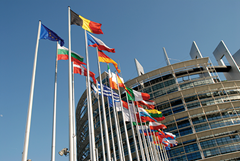How Europe works
Each of the 27 commissioners is nominated by a member state government and approved by the European Parliament. The Commission is the EU’s secretariat and protects the interests of the union as whole. It proposes legislation, which is then influenced by the other institutions. The Commission is appointed after each European Parliament election, held every five years, and its President is chosen by heads of government and heads of state.
José Manuel Barroso (former Prime Minister of Portugal) has been Commission President since 2004. The British Commissioner is Baroness Catherine Ashton (foreign affairs) and the Irish Commissioner is Máire Geoghegan-Quinn (research, innovation and science).
Council
The European Council is the top-level grouping of prime ministers and also heads of state, where they have executive power e.g. the French President. The Commission President is also a member and it choses its own President (for a two-and-a-half year term which is renewable once). Former Belgian Prime Minister Herman van Rompuy was appointed President in 2009. European Council summits set the strategic direction of the EU.
A separate Council of the European Union (formerly known as the Council of Ministers) brings together other government ministers from all member states. It meets in 10 different formats, depending on the policy areas under discussion. Its presidency rotates among countries every six months and is currently held by the Republic of Ireland. Both councils have 345 votes with the number of votes per country allocated by population; the UK has 29 and Ireland seven.
Parliament
The European Parliament is the only directly-elected EU institution and consists of 754 MEPs. Elections for most seats (734) are based on party list systems. The remaining 20 MEPs are elected through the single transferable vote i.e. in Malta, the Republic of Ireland and Northern Ireland. The last European Parliament election took place in 2009, with an overall turnout of 43 per cent; the local turnout was 42.8 per cent. The next election is in June 2014.
Northern Ireland has three MEPs, out of 73 for the whole UK. The Republic of Ireland has 12 MEPs. The Parliament’s President is Martin Schulz, a German Socialist MEP who took office in 2012.
Member states
Austria*
Belgium*
Bulgaria
Cyprus*
Czech Republic
Denmark
Estonia*
Finland*
France*
Germany*
Greece*
Hungary
Ireland*
Italy*
Latvia
Lithuania
Luxembourg*
Malta*
Netherlands*
Poland
Portugal*
Romania
Slovakia*
Slovenia*
Spain*
Sweden
UK
*euro zone
Accession state
Croatia (July 2013)
Candidates
Iceland
Macedonia
Montenegro
Serbia
Turkey
Potential candidates
Albania
Bosnia & Herzegovina
Kosovo






